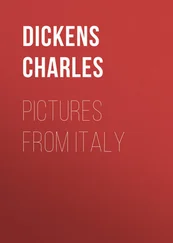Charles Dickens - Pictures from Italy
Здесь есть возможность читать онлайн «Charles Dickens - Pictures from Italy» весь текст электронной книги совершенно бесплатно (целиком полную версию без сокращений). В некоторых случаях можно слушать аудио, скачать через торрент в формате fb2 и присутствует краткое содержание. Жанр: Классическая проза, на английском языке. Описание произведения, (предисловие) а так же отзывы посетителей доступны на портале библиотеки ЛибКат.
- Название:Pictures from Italy
- Автор:
- Жанр:
- Год:неизвестен
- ISBN:нет данных
- Рейтинг книги:5 / 5. Голосов: 1
-
Избранное:Добавить в избранное
- Отзывы:
-
Ваша оценка:
- 100
- 1
- 2
- 3
- 4
- 5
Pictures from Italy: краткое содержание, описание и аннотация
Предлагаем к чтению аннотацию, описание, краткое содержание или предисловие (зависит от того, что написал сам автор книги «Pictures from Italy»). Если вы не нашли необходимую информацию о книге — напишите в комментариях, мы постараемся отыскать её.
Pictures from Italy — читать онлайн бесплатно полную книгу (весь текст) целиком
Ниже представлен текст книги, разбитый по страницам. Система сохранения места последней прочитанной страницы, позволяет с удобством читать онлайн бесплатно книгу «Pictures from Italy», без необходимости каждый раз заново искать на чём Вы остановились. Поставьте закладку, и сможете в любой момент перейти на страницу, на которой закончили чтение.
Интервал:
Закладка:
In the private palaces, pictures are seen to the best advantage. There are seldom so many in one place that the attention need become distracted, or the eye confused. You see them very leisurely; and are rarely interrupted by a crowd of people. There are portraits innumerable, by Titian, and Rembrandt, and Vandyke; heads by Guido, and Domenichino, and Carlo Dolci; various subjects by Correggio, and Murillo, and Raphael, and Salvator Rosa, and Spagnoletto—many of which it would be difficult, indeed, to praise too highly, or to praise enough; such is their tenderness and grace; their noble elevation, purity, and beauty.
The portrait of Beatrice di Cenci, in the Palazzo Berberini, is a picture almost impossible to be forgotten. Through the transcendent sweetness and beauty of the face, there is a something shining out, that haunts me. I see it now, as I see this paper, or my pen. The head is loosely draped in white; the light hair falling down below the linen folds. She has turned suddenly towards you; and there is an expression in the eyes—although they are very tender and gentle—as if the wildness of a momentary terror, or distraction, had been struggled with and overcome, that instant; and nothing but a celestial hope, and a beautiful sorrow, and a desolate earthly helplessness remained. Some stories say that Guido painted it, the night before her execution; some other stories, that he painted it from memory, after having seen her, on her way to the scaffold. I am willing to believe that, as you see her on his canvas, so she turned towards him, in the crowd, from the first sight of the axe, and stamped upon his mind a look which he has stamped on mine as though I had stood beside him in the concourse. The guilty palace of the Cenci: blighting a whole quarter of the town, as it stands withering away by grains: had that face, to my fancy, in its dismal porch, and at its black, blind windows, and flitting up and down its dreary stairs, and growing out of the darkness of the ghostly galleries. The History is written in the Painting; written, in the dying girl's face, by Nature's own hand. And oh! how in that one touch she puts to flight (instead of making kin) the puny world that claim to be related to her, in right of poor conventional forgeries!
I saw in the Palazzo Spada, the statue of Pompey; the statue at whose base Caesar fell. A stern, tremendous figure! I imagined one of greater finish: of the last refinement: full of delicate touches: losing its distinctness, in the giddy eyes of one whose blood was ebbing before it, and settling into some such rigid majesty as this, as Death came creeping over the upturned face.
The excursions in the neighbourhood of Rome are charming, and would be full of interest were it only for the changing views they afford, of the wild Campagna. But, every inch of ground, in every direction, is rich in associations, and in natural beauties. There is Albano, with its lovely lake and wooded shore, and with its wine, that certainly has not improved since the days of Horace, and in these times hardly justifies his panegyric. There is squalid Tivoli, with the river Anio, diverted from its course, and plunging down, headlong, some eighty feet in search of it. With its picturesque Temple of the Sibyl, perched high on a crag; its minor waterfalls glancing and sparkling in the sun; and one good cavern yawning darkly, where the river takes a fearful plunge and shoots on, low down under beetling rocks. There, too, is the Villa d'Este, deserted and decaying among groves of melancholy pine and cypress trees, where it seems to lie in state. Then, there is Frascati, and, on the steep above it, the ruins of Tusculum, where Cicero lived, and wrote, and adorned his favourite house (some fragments of it may yet be seen there), and where Cato was born. We saw its ruined amphitheatre on a grey, dull day, when a shrill March wind was blowing, and when the scattered stones of the old city lay strewn about the lonely eminence, as desolate and dead as the ashes of a long extinguished fire.
One day we walked out, a little party of three, to Albano, fourteen miles distant; possessed by a great desire to go there by the ancient Appian way, long since ruined and overgrown. We started at half-past seven in the morning, and within an hour or so were out upon the open Campagna. For twelve miles we went climbing on, over an unbroken succession of mounds, and heaps, and hills, of ruin. Tombs and temples, overthrown and prostrate; small fragments of columns, friezes, pediments; great blocks of granite and marble; mouldering arches, grass-grown and decayed; ruin enough to build a spacious city from; lay strewn about us. Sometimes, loose walls, built up from these fragments by the shepherds, came across our path; sometimes, a ditch between two mounds of broken stones, obstructed our progress; sometimes, the fragments themselves, rolling from beneath our feet, made it a toilsome matter to advance; but it was always ruin. Now, we tracked a piece of the old road, above the ground; now traced it, underneath a grassy covering, as if that were its grave; but all the way was ruin. In the distance, ruined aqueducts went stalking on their giant course along the plain; and every breath of wind that swept towards us, stirred early flowers and grasses, springing up, spontaneously, on miles of ruin. The unseen larks above us, who alone disturbed the awful silence, had their nests in ruin; and the fierce herdsmen, clad in sheepskins, who now and then scowled out upon us from their sleeping nooks, were housed in ruin. The aspect of the desolate Campagna in one direction, where it was most level, reminded me of an American prairie; but what is the solitude of a region where men have never dwelt, to that of a Desert, where a mighty race have left their footprints in the earth from which they have vanished; where the resting-places of their Dead, have fallen like their Dead; and the broken hour-glass of Time is but a heap of idle dust! Returning, by the road, at sunset! and looking, from the distance, on the course we had taken in the morning, I almost feel (as I had felt when I first saw it, at that hour) as if the sun would never rise again, but looked its last, that night, upon a ruined world.
To come again on Rome, by moonlight, after such an expedition, is a fitting close to such a day. The narrow streets, devoid of footways, and choked, in every obscure corner, by heaps of dunghillrubbish, contrast so strongly, in their cramped dimensions, and their filth, and darkness, with the broad square before some haughty church: in the centre of which, a hieroglyphic-covered obelisk, brought from Egypt in the days of the Emperors, looks strangely on the foreign scene about it; or perhaps an ancient pillar, with its honoured statue overthrown, supports a Christian saint: Marcus Aurelius giving place to Paul, and Trajan to St. Peter. Then, there are the ponderous buildings reared from the spoliation of the Coliseum, shutting out the moon, like mountains: while here and there, are broken arches and rent walls, through which it gushes freely, as the life comes pouring from a wound. The little town of miserable houses, walled, and shut in by barred gates, is the quarter where the Jews are locked up nightly, when the clock strikes eight—a miserable place, densely populated, and reeking with bad odours, but where the people are industrious and money-getting. In the day-time, as you make your way along the narrow streets, you see them all at work: upon the pavement, oftener than in their dark and frouzy shops: furbishing old clothes, and driving bargains.
Crossing from these patches of thick darkness, out into the moon once more, the fountain of Trevi, welling from a hundred jets, and rolling over mimic rocks, is silvery to the eye and ear. In the narrow little throat of street, beyond, a booth, dressed out with flaring lamps, and boughs of trees, attracts a group of sulky Romans round its smoky coppers of hot broth, and cauliflower stew; its trays of fried fish, and its flasks of wine. As you rattle round the sharply-twisting corner, a lumbering sound is heard. The coachman stops abruptly, and uncovers, as a van comes slowly by, preceded by a man who bears a large cross; by a torch-bearer; and a priest: the latter chaunting as he goes. It is the Dead Cart, with the bodies of the poor, on their way to burial in the Sacred Field outside the walls, where they will be thrown into the pit that will be covered with a stone to-night, and sealed up for a year.
Читать дальшеИнтервал:
Закладка:
Похожие книги на «Pictures from Italy»
Представляем Вашему вниманию похожие книги на «Pictures from Italy» списком для выбора. Мы отобрали схожую по названию и смыслу литературу в надежде предоставить читателям больше вариантов отыскать новые, интересные, ещё непрочитанные произведения.
Обсуждение, отзывы о книге «Pictures from Italy» и просто собственные мнения читателей. Оставьте ваши комментарии, напишите, что Вы думаете о произведении, его смысле или главных героях. Укажите что конкретно понравилось, а что нет, и почему Вы так считаете.












